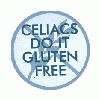
Lisa
-
Posts
8,691 -
Joined
-
Last visited
-
Days Won
15
Lisa's Achievements
-
-
The research organizations recommend 3-4 slices (or equivalent) pieces of bread a day for six to eight weeks.
If you know that gluten is your problem, you should know that many here are self diagnosed and feel quite comfortable with that conclusion.
If you would like to be tested. This is what you should request from your doctor:
Anti-gliadin antibodies (AGA) both IgA and IgG
Anti-endomysial antibodies (EMA) - IgA
Anti-tissue transglutaminase antibodies (tTG) - IgA
Total IgA level.
-
Hi Fluffy,
No, not on the Mod Thread. That's for business.
 But jump over to the "Funny Pages - Tickle Me Elbow" Thread and find out who in the Sam Hill is messing with that statue.
But jump over to the "Funny Pages - Tickle Me Elbow" Thread and find out who in the Sam Hill is messing with that statue.  Everyone is welcome
Everyone is welcome  But you have to put your silly on.
But you have to put your silly on. -
-
Thanks for posting.
-
I look forward to the day when I'm well enough and smart enough to help others the way you and others have helped me. Thank you so much.
Ann
 You will, and then it will be your turn to "pay it forward".
You will, and then it will be your turn to "pay it forward". -
I thought that whiskey is a grain alcohol and off limits, like beer. You might want to double check your sources that say it is ok. I stick to rum, wine, and tequila.
Okey Doke! Can do...
https://www.celiac.com/articles/184/1/Ameri...Diet/Page1.html
At the most basic level the new guidelines mean that celiacs do not need to avoid foods containing unidentified vinegar or distilled alcohol, this alone will allow much more freedom when shopping or eating out. Further, celiacs who drink alcohol will have much more freedom and a far greater choice when they want to have a drink. Additionally, celiacs will be able to more easily maintain a well-rounded and nutritious diet because they will have access to a far greater number of highly nutritious and safe grains.
https://www.celiac.com/articles/222/1/Glute...ages/Page1.html
All distilled alcohols are gluten-free.
Open Original Shared Link
All distilled beverages, a.k.a. spirits, are gluten-free. Distilled beverages with added flavoring are not necessarily gluten-free, but several type of American schnapps are. If the distilled beverage has flavoring, please check before drinking. Below is our list of definitely gluten-free alcohol. As you can see, there’s a very large variety that you can drink. Cheers!
Beer is in a separate category. Many years ago, distilled alcohol WAS considered unsafe. Leaning the ins and outs can be very confusing.

-
it is MY understanding that whisky---the scotch stuff made in Scotland is processed much finer and simply (single malt). Whiskey---the bourbon made in the US often adds other grains to enhance the flavors. I have never been bothered by the finer whisky's but the bourbon whiskey often does if I have much of it.
Any distilled alcohol is considered safe for people with Celiac to consume.
It is commonly known that your tolerance with change. Use caution

-
I'm learning a lot, in my travels through this thread....

Open Original Shared Link
Q & As about Fresh Produce
Q What is "organic produce"?
A Organic produce is grown without using most conventional pesticides; fertilizers made with synthetic ingredients or sewage sludge; bioengineering; or ionizing radiation.
Before a product can be labeled "organic," a government-approved certifier inspects the farm where the food is grown to make sure the farmer meets the U.S. Department of Agriculture's organic standards. Companies that handle or process organic food before it reaches the supermarket or restaurant must be certified, too.
Q What is ethylene gas - and how does it affect produce?
A Some fruits and vegetables - like bananas - naturally produce ethylene gas when they ripen. Oftentimes, such fruits and vegetables are harvested in the unripened state to preserve firmness and for long shelf life; they are later exposed to ethylene gas to induce ripening.
Q What does the "use-by" date mean on a package of fresh produce?
A "Best-If-Used-By- (or Before)" date is the last date recommended for peak quality as determined by the manufacturer of the product.
Q Why are wax coatings used on fruits and vegetables?
A Many vegetables and fruits make their own natural waxy coating. After harvest, fresh produce may be washed to clean off dirt and soil - but such washing also removes the natural wax. Therefore, waxes are applied to some produce to replace the natural waxes that are lost.
Wax coatings help retain moisture to maintain quality from farm to table including:
when produce is shipped from farm to market
while it is in the stores and restaurants
once it is in the home
Waxes also help inhibit mold growth, protect produce from bruising, prevent other physical damage and disease, and enhance appearance.
Q How are waxes applied?
A Waxes are used only in tiny amounts to provide a microscopic coating surrounding the entire product. Each piece of waxed produce has only a drop or two of wax.
Coatings used on fruits and vegetables must meet FDA food additive regulations for safety. Produce shippers and supermarkets in the United States are required by federal law to label fresh fruits and vegetables that have been waxed so you will know whether the produce you buy is coated. Watch for signs that say: "Coated with food-grade vegetable-, petroleum-, beeswax-, or shellac- based wax or resin, to maintain freshness."
-
Open Original Shared Link
Open Original Shared Link
Open Original Shared Link
Fresh fruit and vegtables in their natural state are not subject to Federal Allergen Labeling and Consumer Protections Act.
And lastly, a Canadian Article:
Open Original Shared Link
The CFIA reminds the industry to be aware of most common priority allergens such as peanuts; tree nuts; sesame seeds; milk; eggs; soy; fish and shellfish, crustaceans; wheat; gluten; and sulphite. These priority allergens and any proteins derived from them should not be used as components of fruit and vegetable coatings because there are no labelling requirements to declare coating or wax components on the fresh produce. Therefore there would be no warning for an allergic consumer about the presence of these priority allergens on the fresh produce.
OKay, I'll go away now.

-
Thank you both. Very interesting. Looks like our world is opening up a bit every day.
-
Here is some information for you:
Open Original Shared Link
This is a great place to learn about the diet. Welcome
-
This is the full Serologic Panel for Celiac that needs to be taken. Are you still eating a full gluten diet?
Open Original Shared Link
-
Welcome!
These are the tests:
Anti-gliadin antibodies (AGA) both IgA and IgG
Anti-endomysial antibodies (EMA) - IgA
Anti-tissue transglutaminase antibodies (tTG) - IgA
Total IgA level.
Hope you find your answers soon.
-
Hi Ben,
Post your result here and include the lab ranges. Someone can help you.
-
"
However, as it states above, Ethyl alcohol or ethanol could be a compound added to some waxes, and that's where gluten can become a factor. Ethanol can be made from wheat. It is also made from corn and sugar, but can be made from wheat straw.
Ethanol is distilled and considered to be gluten free, regardless of the source.
Learning what's safe and what isn't, is not always easy.

-
I found it on the FDA's website
Open Original Shared Link
It says: #
Are there examples of food products that are naturally "gluten-free"?
Yes. The following are examples of, but are not limited to, foods that are naturally gluten-free:
* milk; nonfat dry milk)
* 100 percent fruit or vegetable juices
* Fresh fruits and vegetables that are not coated with a wax or resin that contains gluten
* A variety of single ingredient foods: butter; eggs; lentils; peanuts; seeds like flax; tree nuts like almonds; non-gluten containing grains like corn; fresh fish like cod; fresh shellfish like clams; honey; and water.
Open Original Shared Link
I. Overview
A. Purpose
Accurate and informative labeling is critical for allergic consumers, individuals with celiac disease, and their families because they need to rely on strict avoidance of specific foods and ingredients to prevent potentially serious reactions. The Food Allergen Labeling and Consumer Protection Act of 2004 (P.L. 108-282) (FALCPA) amends the Federal Food, Drug, and Cosmetic Act (FFDCA) and requires that the label of a food product that is or contains an ingredient that bears or contains a "major food allergen " declare the presence of the allergen as specified by FALCPA. FALCPA defines a "major food allergen " as one of eight foods or food groups (milk, egg, fish, crustacean shellfish, tree nuts, wheat, peanuts, and soybeans) or a food ingredient that contains protein derived from one of those foods.
An important scientific issue associated with the implementation of FALCPA is the existence of threshold levels below which it is unlikely that a food allergic individual would experience an adverse effect. FALCPA provides two processes by which an ingredient may be exempted from the FALCPA labeling requirements, a petition process [21 U.S.C. 343(w)(6)] and a notification process [21 U.S.C. 343(w)(7)]. Under the petition process, an ingredient may be exempt if the petitioner demonstrates that the ingredient "does not cause an allergic reaction that poses a risk to human health." Under the notification process, an ingredient may be exempt if the notification contains scientific evidence that demonstrates that the ingredient "does not contain allergenic protein," or if FDA previously has determined, under section 409 of the FFDCA, that the food ingredient does not cause an allergic response that poses a risk to human health. Thus, understanding food allergen thresholds and developing a sound scientific framework for such thresholds are likely to be centrally important to FDA's analysis of, and response to, FALCPA petitions and notifications
-
Hi Kerri,
Yes, a positive endoscopy and biopsy, coupled with your symptom would most likely indicate Celiac Disease. Serologic panels for Celiac are not as reliable as we would like at this time.
I would think that you will see a marked difference in how you feel by beginning the gluten free diet. There is a load of information here that can help you get started. And, please feel free to ask any question.
Welcome to the Club!

-
Would you kindly post documentation about fruits and vegetable being coated with potential gluten?
-
I know this was discussed in the past and I can search later when I'm not at work. Was there an answer to the question of whether strawberries could have gluten from the straw they are grown on? I realize that there is probably lots of variation with regards to really using straw, etc.
Tim, this is the only thing that I was able to find regarding this subject. It's a Brazilian STUDY and I don't know how dated it is. This study has nothing to do with US products. Perhaps this why this myth just won't go away.
Open Original Shared Link
-
Laws do get broken. That's why we have consumer advocates, police, lawyers, courts, judges.............
True, but to coat fruit with one of the top allergens, a supplier/producer/farmer would only be asking for serious repercussions, from multiple directions.
-
Hi, I just wanted to tell you that I met a woman a wedding who is a celiac, like myself, and she was getting sick on a regular basis. She eventually traced it back to the frozen strawberries by making repeated calls to the company. It turned out that wheat was used as a coating, but it was such an insignificant amount that the company did not have list it on ingredients (regardless of whether or not it is one of the top allergens). Unfortunately, I don't know what brand she had bought or whether your blueberries are from the same company and I don't know who she is outside of that wedding. I disregarded it as information to follow up because I hate frozen fruit--sorry! However, I wanted to tell you that if wheat can be in frozen strawberries without being listed, there is a very good chance that it is on blueberries. So, don't throw out your cereal boxes yet. :-)
Have you seen any documentation regarding strawberries coated with wheat. If so, please post it. I understand and appreciate your willingness to share information. But, documentation is very important when dealing with our health. Claims of stawberries coated with gluten can cause undo panic and concern.
Open Original Shared Link
It is my understanding that anytime a top eight allergen is used in/on a product, that it must be disclosed, by law.
-
Open Original Shared Link
This article has some good resources.
-
I just stumbled upon this old thread after googling "is splenda brown sugar gluten free?" My hubby and I are making gluten-free cookies tonight
 Did anyone get confirmation on this?
Did anyone get confirmation on this? Thanks!
Jillian
Open Original Shared Link
SPLENDA
-
I know you have this information Amy. Hopefully, this will help others:
Open Original Shared Link
Open Original Shared Link






Hershey's Semi Sweet Chocolate Chips
in Gluten-Free Foods, Products, Shopping & Medications
Posted
Hershey is not top of my list for "good" companies. They will not disclose their sourse of "natural flavors" and prefer to protect their suppliers, rather than support the millions of people who purchase their products. Nope, Hershey products are not on my shopping list.
Betty Crocker makes some drop dead Choc. Chip Cookie Mix. You can find it in the regular baking section of your grocery store.
I can't tell you if Hershey Chips are gluten free and nor will they. BUT, I do hope you feel better soon.